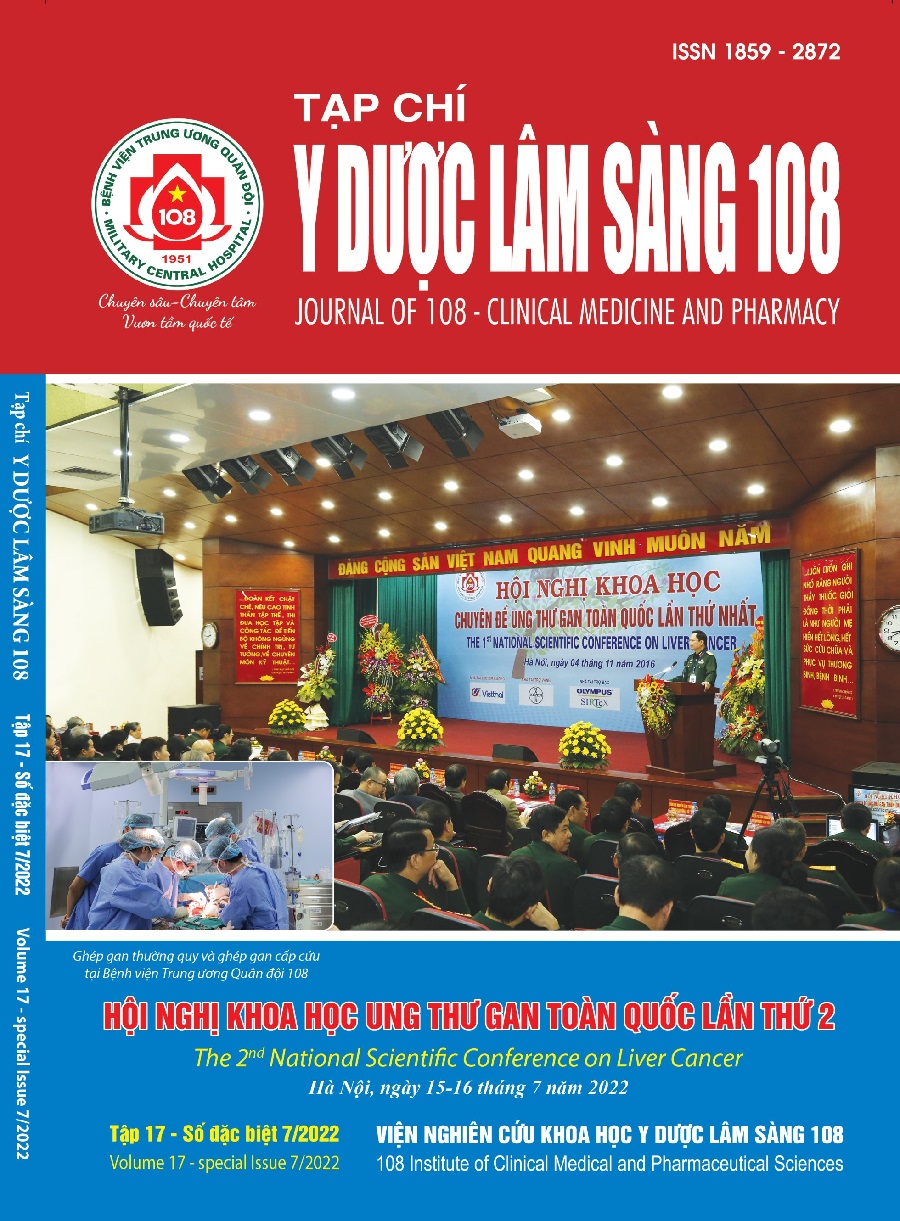Effects of p16 and RASSF1A on hepatocellular carcinoma patients
Main Article Content
Keywords
Abstract
Epigenetic changes in gene expression due to CpG island methylation are the main cause of p16 gene inactivation. Recently, it has been suggested that the RASSF1A and p16 genes can be inactivated by methylation. Objective: To analyze the impact factors and the methylation of tissue samples in liver cancer patients. Subject and method: Testing of age groups, factors affecting hepatocellular carcinoma and the influence of methylation of two factors RASSF1A and p16 on cancer patients. Result: Hepatocellular carcinoma patients were aged from 50 to 70 years old, the highest rate 42% (p<0.05) in the age group from 60 to 70, and men had a higher incidence than women (male: 74%, female: 26%, p<0.05). The number of smokers in HCC accounted for 42.85 - 100% depending on age and the rate of people who drink alcohol in HCC was relatively low (16.67 - 19.05%) and concentrated in the age group from 50 to 70. The rate of HbsAg-positive patients was 55.56 - 100% and concentrates on 40 - 70 years old. The positive rate for anti HCV was low (28.57 - 33.33%) and concentrates in the age group from 50 to 70 years old. The percentage of samples containing p16 accounted for 44%, including methylation 63.64% in liver cancer patients and 36.36% in normal people with size of 93bp. RASSF1A samples accounted for 58% of which methylation 60.35% in liver cancer patients and 39.65% in normal people with size of 145bp. Methylation of p16 and RASSF1A in patients over 65 years of age occurs more frequently than in other age groups, and the distribution of these 2 loci in HCV-positive patients is higher than others. Conclusion: Methylation of p16 and RASSF1A is strongly associated with hepatocellular carcinoma patients and is dependent on age and sex.
Article Details
References
2. Yu-Jing Zhang, Habibul Ahsan et al (2002) High frequency of promoter hypermethylation of RASSF1A and p16 and its relationship to aflatoxin B1-DNA adduct levels in human hepatocellular carcinoma Mol Carcinog 35(2): 85-92. doi: 10.1002/mc.10076.
3. Dammann R, Li C et al (2000) Epigenetic inactivation of a RAS association domain family protein from the lung tumour suppressor locus 3p21.3. Nat Genet 25(3): 315-319. doi: 10.1038/77083.
4. Kok K, Naylor SL et al (1997) Deletions of the short arm of chromosome 3 in solid tumors and the search for suppressor genes. Adv Cancer Res 71: 27-92. doi: 10.1016/s0065-230x(08)60096-2.
5. Trần Văn Huy (2003). Nghiên cứu dấu ấn vi rút viêm gan B, C và đặc điểm lâm sàng ung thư biểu mô tế bào gan. Luận án tiến sĩ Y học, Trường Đại Học Y Huế.
6. Varayu Prachayakul, Jiraporn Kanchanapermpoon et al (2017) DNA methylation markers improve
the sensitivity of endoscopic retrograde cholangiopancreatography-based brushing cytology in extrahepatic cholangiocarcinoma. Technology in Cancer Research & Treatment 16(6): 1252-1258 ª The Author(s) 2017 Reprints and permission: sagepub.com/journalsPermissions.nav DOI: 10.1177/ 1533034617748090journals.sagepub.com/home/tct.
7. Zengli Guo et al (2020) DCAF1 regulates Treg senescence via the ROS axis during immunological aging. J Clin Invest 130(11): 5893-5908. Published online. doi: 10.1172/JCI136466.
8. Snorri S Thorgeirsson , Joe W Grisham (2002). Molecular pathogenesis of human hepatocellular carcinoma 31(4): 339-346.doi: 10.1038/ng0802-339.
9. Marianne Frommer, Louise E Mcdonald et al (1992) A genomic sequencing protocol that yields a positive display of 5-methylcytosine residues in individual DNA strands. Proc. Nati. Acad. Sci. USA 89: 1827-1831, March 1992 Genetics.
10. Nishida N, Nishimura T et al (2007). Extensive methylation is associated with beta-catenin mutations in hepatocellular carcinoma: Evidence for two distinct pathways of human hepatocarcinogenesis. Cancer Res 67: 4586-4594.
11. Katherine A McGlynn, Jessica L Petrick et al (2020) Epidemiology of hepatocellular carcinoma hepatology. Suppl 1(1): 4-13. doi: 10.1002/hep.31288.
12. Sheng Zhong , Winnie Yeo (2003) Intensive hypermethylation of the CpG island of Ras association domain family 1A in hepatitis B virus-associated hepatocellular carcinomas. Clin Cancer Res 9(9): 3376-3382.
13. Rocco JW, Sidransky D (2001) p16(MTS-1/CDKN2/INK4a) in cancer progression. Exp Cell Res 264(1): 42-55. doi: 10.1006/excr.2000.5149.
14. Snorri S Thorgeirsson, Joe W Grisham (2002) Molecular pathogenesis of human hepatocellular carcinoma. 31(4): 339-346.doi: 10.1038/ng0802-339.
15. Jicai Z, Zongtao Y (2006) Persistent infection of hepatitis B virus is involved in high rate of p16 methylation in hepatocellular carcinoma. Mol Carcinog 45: 530-536.
 ISSN: 1859 - 2872
ISSN: 1859 - 2872
